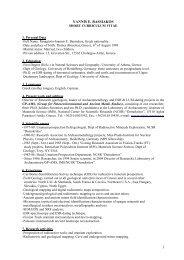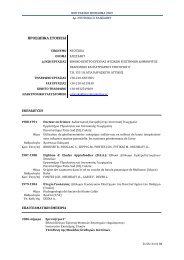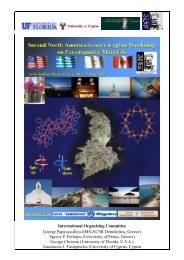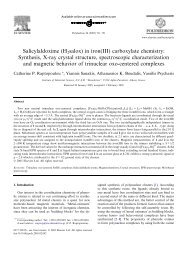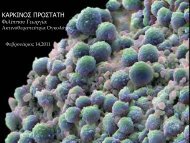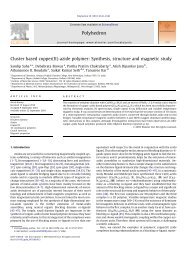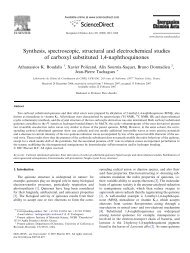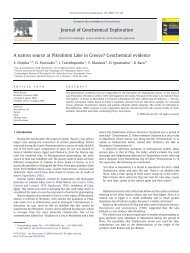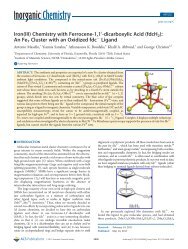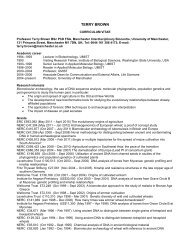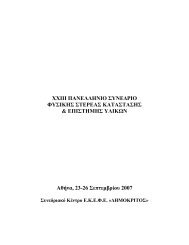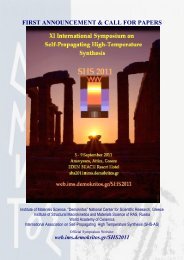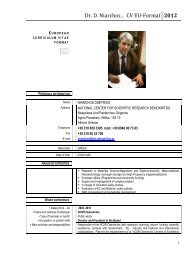NRC Annual Report 2001-2002
NRC Annual Report 2001-2002
NRC Annual Report 2001-2002
- No tags were found...
You also want an ePaper? Increase the reach of your titles
YUMPU automatically turns print PDFs into web optimized ePapers that Google loves.
N R C – F R O M D I S C O V E R Y T O I N N O V A T I O N...Training to meet Canada’s needfor a specialized workforceThe creation of new technologies requires a workforcethat has the knowledge to properly use them.To give future graduates advanced industryorientedskills, <strong>NRC</strong>-IMI has signed an agreementwith six educational institutions in three provinces.The agreement will allow <strong>NRC</strong> to transfer its technologyexpertise and achievements in a structuredenvironment that will help students build skills andgain relevant practical experience. The universitypartners include McGill University, ÉcolePolytechnique, Université Laval, the University ofWindsor, the University of New Brunswick, andAhuntsic College. The activities will focus on theuse of process modelling and simulations softwaredeveloped at <strong>NRC</strong>-IMI, within the framework oftraining programs for engineers and technicalofficers at the six institutions.New graduate bio-based curriculum<strong>NRC</strong>-BRI is collaborating with Oklahoma StateUniversity in the development of a new studentinternship program that will be part of its “BiobasedProducts Graduate Program” scheduled tostart in the fall of <strong>2002</strong>. The university’s researchprogram is focused on developing bio-based technologiesfor converting agricultural raw materialsinto various chemical feedstocks. Students willwork in multi-disciplinary teams to become familiarwith bio-based or bioconversion research involvedwith these technologies. The U.S. Department ofEnergy, recognizing the expected energy shortageand the need for alternatives, such as the use ofbiomass to produce energy, will fund the trainees.<strong>NRC</strong>-BRI will welcome a number of the trainees onan annual basis to provide hands-on experience.50Student and youth outreachIn <strong>2001</strong>-<strong>2002</strong>, <strong>NRC</strong> student programs provideddirect, hands-on training and development work forsome 781 graduate, co-op and summer students,and approximately 222 post-doctoral fellows(PDFs). As an ongoing program, <strong>NRC</strong> and theUniversity of Ottawa also hosted four high schoolstudents from Taiwan on six-week summer workassignments. <strong>NRC</strong> also continued its Women inEngineering and Science (WES) Program to helpencourage talented female students to pursueprofessional careers in engineering and science.Helping young Canadians reachtheir potentialA strong science culture is a keystone of Canada’sinnovation system. Young Canadians, in particular,need to understand and see the benefits oflearning science and engineering for their futurecareers and adult lives. In addition to direct experience,employment and training opportunities, <strong>NRC</strong>works to interest young Canadians in careers inscience and technology through a variety of activitiesin communities across Canada, including visitprograms for schools (and their teachers), scienceand engineering challenges, and science promotionactivities, such as the publication of scienceresource materials.PDFs and RAs100 150 <strong>2001</strong>997-19981998-19991999-20002000-<strong>2001</strong><strong>2001</strong>-<strong>2002</strong>250Total research assistantsTotal post-doctoral fellows (NSERC visiting fellows)



